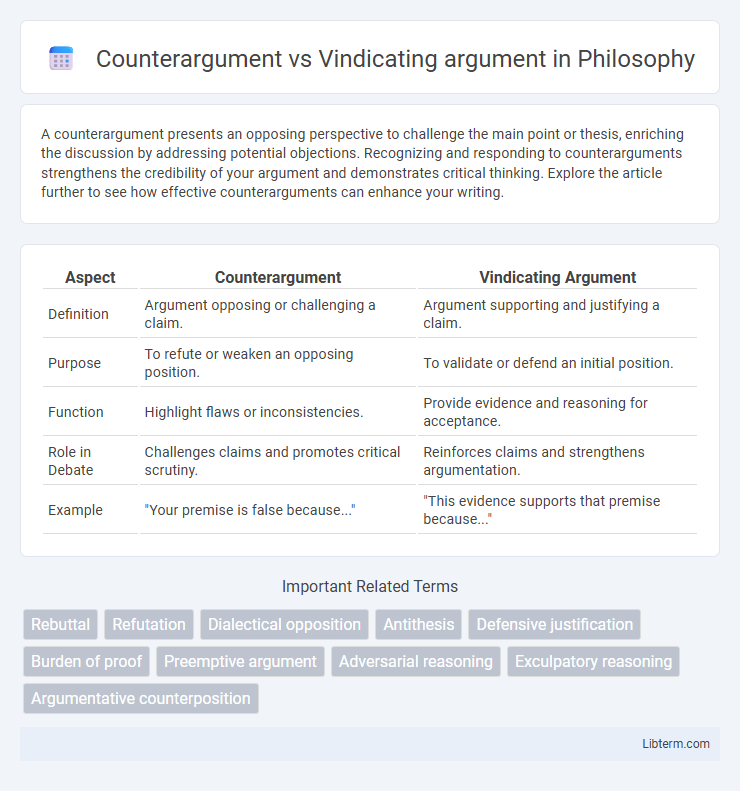A counterargument presents an opposing perspective to challenge the main point or thesis, enriching the discussion by addressing potential objections. Recognizing and responding to counterarguments strengthens the credibility of your argument and demonstrates critical thinking. Explore the article further to see how effective counterarguments can enhance your writing.
Table of Comparison
| Aspect | Counterargument | Vindicating Argument |
|---|---|---|
| Definition | Argument opposing or challenging a claim. | Argument supporting and justifying a claim. |
| Purpose | To refute or weaken an opposing position. | To validate or defend an initial position. |
| Function | Highlight flaws or inconsistencies. | Provide evidence and reasoning for acceptance. |
| Role in Debate | Challenges claims and promotes critical scrutiny. | Reinforces claims and strengthens argumentation. |
| Example | "Your premise is false because..." | "This evidence supports that premise because..." |
Understanding Counterarguments: Definition and Importance
Counterarguments refer to opposing viewpoints presented to challenge or refute a claim, enhancing critical thinking and argumentative depth. Understanding counterarguments involves recognizing their role in strengthening the original argument by addressing potential objections. This process improves persuasive communication by demonstrating thorough analysis and fairness in evaluating different perspectives.
What is a Vindicating Argument? Key Features
A vindicating argument provides a rational justification that supports the validity or truth of a claim, aiming to defend it against criticisms and objections. Key features include presenting evidence or logical reasoning to reaffirm the claim's credibility, clarifying misunderstandings, and addressing counterarguments effectively. Unlike counterarguments that challenge a position, vindicating arguments strengthen and legitimize the original stance through systematic explanation or proof.
Counterargument vs Vindicating Argument: Core Differences
Counterarguments present opposing viewpoints or objections to a claim, aiming to challenge or refute the original argument. Vindicating arguments, in contrast, provide justification or evidence that defends and supports the validity of a claim against criticism. The core difference lies in counterarguments questioning the claim's credibility, while vindicating arguments strengthen its legitimacy through corroborative reasoning.
The Role of Counterarguments in Persuasive Writing
Counterarguments play a crucial role in persuasive writing by anticipating and addressing potential objections, which enhances the writer's credibility and strengthens the overall argument. Presenting a counterargument transparently demonstrates an understanding of diverse perspectives while allowing the author to refute opposing views effectively, thus reinforcing their position. Integrating counterarguments strategically leads to a more balanced and compelling case, convincing readers through critical engagement rather than one-sided assertion.
Vindicating Arguments: Strengthening Your Thesis
Vindicating arguments play a crucial role in strengthening your thesis by providing evidence and reasoning that affirm its validity against opposing claims. These arguments reinforce the credibility of your position through well-substantiated support, making your overall argument more persuasive and resilient. Employing vindicating arguments effectively addresses doubts and solidifies the foundation of your thesis in academic and persuasive writing.
When to Use Counterarguments in Debates
Counterarguments are essential in debates to address opposing viewpoints directly, demonstrating a thorough understanding of the topic and strengthening your position by preemptively refuting criticism. Their strategic use is most effective when the opposition's argument is strong or widely accepted, as this approach enhances credibility and persuades skeptical audiences. Employ counterarguments to highlight weaknesses in opposing claims while reinforcing your evidence, creating a balanced and compelling narrative.
How Vindicating Arguments Enhance Credibility
Vindicating arguments enhance credibility by providing clear evidence and logical reasoning that directly address and refute potential counterarguments, demonstrating thorough understanding and fairness. They reinforce the strength of the original claim by validating its premises and mitigating doubts, which fosters trust in the argument's reliability. This method of argumentation ultimately solidifies the speaker's or writer's authority and persuasive power in debates and discussions.
Common Mistakes in Addressing Counterarguments
Common mistakes in addressing counterarguments include misrepresenting or oversimplifying opposing views, which weakens the overall argument by appearing biased or uninformed. Failing to acknowledge valid points within counterarguments can reduce credibility and alienate critical readers. Effective vindicating arguments directly engage with counterarguments by providing clear evidence and reasoning that reinforce the original claim while respecting the complexity of opposing perspectives.
Integrating Vindicating Arguments for Stronger Conclusions
Integrating vindicating arguments enhances the strength of conclusions by systematically addressing counterarguments and reaffirming the validity of the original claim. This approach involves presenting evidence or reasoning that not only counters opposing views but also justifies the original position despite objections. Employing this strategy creates more resilient and persuasive arguments, crucial in academic writing and critical debates.
Counterarguments and Vindication: Balancing Objectivity and Persuasion
Counterarguments challenge the initial claim by presenting opposing evidence or reasoning, fostering critical analysis and enhancing argumentative strength. Vindicating arguments defend or justify a position, aiming to restore credibility and reinforce the original thesis through supportive evidence. Balancing counterarguments with vindication ensures objectivity while maintaining persuasive impact in discourse.
Counterargument Infographic

 libterm.com
libterm.com